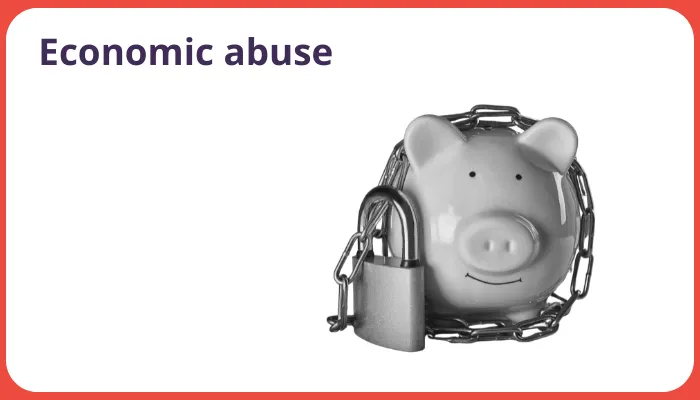Every child's well-being matters.
Types of Abuse Articles
Quick Access
Abuse of Authority
Abuse of Discretion
Abuse of Power
Behavioural Indications
Breast Ironing
County Lines
Cultural Differences (Physical Abuse)
Domestic Abuse
Economic Abuse
Emotional Signs
Exposure to Substance Abuse
Failure to Thrive
Female Genital Mutilation (FGM)
Forced Marriage
Hate Crimes & Targeted Harassment
Impact of Domestic Violence
Impact of Environment
Impact on Development
Institutional Abuse
Isolation
Modern Slavery
Neglect
Online Abuse
Parental Behaviours
Physical Abuse
Radicalisation
Religious Abuse
Restraint
Sexual Abuse
Types of Abuse
Witnessing Domestic Abuse

What Are the Signs of Economic Abuse?
Custom HTML/CSS/JAVASCRIPT
Economic abuse is a form of abuse where one person controls another's access to money, limiting their ability to support themselves and their children. This type of abuse can affect anyone, including parents and the practitioners who work with young children.
As nursery owners and managers, it's crucial to recognise the signs of economic abuse to ensure the well-being of both the children and the adults in your care.
Signs of Economic Abuse in Children
Young children may not understand economic abuse, but its effects can show up in their behaviour and well-being. Here are some signs to watch for:
1. Changes in Behaviour: Children may become withdrawn, anxious, or show sudden changes in behaviour. They might seem unusually quiet or, conversely, act out more than usual. Take notice and question that things might be difficult at home if a child who is normally cheerful becomes sullen or if a typically calm child starts having frequent tantrums.
2. Physical Signs: Lack of appropriate clothing for the weather, poor hygiene, or signs of hunger can indicate that a child's basic needs are not being met due to financial control or hardship. For example, a child coming to nursery in clothes that are too small, worn out, or not suitable for the season could be a red flag. Additionally, consistently being unkempt or having untreated medical issues are signs that a child's caregiver might be struggling financially.
3. Absenteeism: Frequent absences or lateness could be a sign that parents are struggling with transportation or other financial constraints. If a child often misses sessions or arrives late without a clear explanation, it might be because finances are being controlled and so transportation is difficult, or other coercive behaviours are going on.
4. Comments and Conversations: Listen to what children say about their home life. They might make offhand comments that hint at financial struggles, such as talking about not having enough food at home, their parents arguing about money, their parents being unable to afford certain things, or someone needing permission to spend money on essentials.
5. Lack of Participation: Children might be unable to participate in activities that require extra fees, such as field trips or special events. If a child is often left out of such activities and this doesn’t match your perception of the families’ economic standing, it could be a sign of financial control.
By paying attention to these signs, you can identify children who might be affected by economic abuse and take steps to support them.
Signs of Economic Abuse in Practitioners
Your staff members might also be experiencing economic abuse. It's important to recognise the signs to support them effectively:
1. Financial Stress: Practitioners might talk about not having enough money for basic necessities or seem constantly worried about finances.
2. Restricted Access: They may not have control over their bank accounts, credit cards, or spending decisions. This could manifest in them needing permission to make even minor purchases.
3. Dependency: A staff member might rely heavily on their partner or another person for financial support, which can lead to stress and a lack of independence.
Signs of Economic Abuse in Parents
Parents of the children in your nursery might also be victims of economic abuse. Here are some signs to look out for:
1. Control and Monitoring: A parent might mention that their partner closely monitors their spending or restricts their access to money, or say that they need permission to buy certain basic things.
2. Lack of Funds: Parents may struggle to pay nursery fees, buy supplies for their children, or seem constantly anxious about money.
3. Isolation: Abusers often isolate their victims. If a parent seems cut off from family or friends, it might be a sign of economic control.
How to Support Those Affected by Economic Abuse
As nursery owners and managers, you can play a key role in supporting those affected by economic abuse. Here are some tips:
1. Create a Safe Environment: Make your nursery a place where both children and adults feel safe to share their concerns. Listen without judgment and offer support.
2. Provide Resources: Have information available about local support services, such as shelters, financial counselling, and legal assistance.
3. Offer Flexibility: Be understanding about payment plans for parents who might be struggling. For staff, offer flexible hours or additional support where possible.
4. Educate: Provide training for your staff on recognising and responding to signs of economic abuse. Awareness can empower them to support each other and the families you serve.
By being vigilant and compassionate, you can help mitigate the impact of economic abuse and create a nurturing environment for everyone involved with your nursery.
AUTHOR:- Iona has nearly 10 years of experience supporting nurseries and childminders in curriculum planning, leadership, and safeguarding. Her writing is informed by public information and sector insight, aiming to provide accessible, practical support for professionals working with children. She is part of the On the Button team, helping deliver Well-being, Safeguarding and Complaint Management Software that empowers practitioners to identify concerns early and act confidently.
On the Button provides innovative software tailored to the needs of the early years sector, with a strong focus on EYFS well-being and early years safeguarding. Our tools help senior practitioners to confidently track concerns, maintain robust records, and respond effectively — all while meeting statutory guidance. From early years complaint management to team-wide safeguarding alerts, our platform puts children's safety and emotional health first.

Quick Access
Abuse of Authority
Abuse of Discretion
Abuse of Power
Behavioural Indications
Breast Ironing
County Lines
Cultural Differences (Physical Abuse)
Domestic Abuse
Economic Abuse
Emotional Signs
Exposure to Substance Abuse
Failure to Thrive
Female Genital Mutilation (FGM)
Forced Marriage
Hate Crimes & Targeted Harassment
Impact of Domestic Violence
Impact of Environment
Impact on Development
Institutional Abuse
Isolation
Modern Slavery
Neglect
Online Abuse
Parental Behaviours
Physical Abuse
Radicalisation
Religious Abuse
Restraint
Sexual Abuse
Types of Abuse
Witnessing Domestic Abuse

What Are the Signs of Economic Abuse?
Custom HTML/CSS/JAVASCRIPT
Economic abuse is a form of abuse where one person controls another's access to money, limiting their ability to support themselves and their children. This type of abuse can affect anyone, including parents and the practitioners who work with young children.
As nursery owners and managers, it's crucial to recognise the signs of economic abuse to ensure the well-being of both the children and the adults in your care.
Signs of Economic Abuse in Children
Young children may not understand economic abuse, but its effects can show up in their behaviour and well-being. Here are some signs to watch for:
1. Changes in Behaviour: Children may become withdrawn, anxious, or show sudden changes in behaviour. They might seem unusually quiet or, conversely, act out more than usual. Take notice and question that things might be difficult at home if a child who is normally cheerful becomes sullen or if a typically calm child starts having frequent tantrums.
2. Physical Signs: Lack of appropriate clothing for the weather, poor hygiene, or signs of hunger can indicate that a child's basic needs are not being met due to financial control or hardship. For example, a child coming to nursery in clothes that are too small, worn out, or not suitable for the season could be a red flag. Additionally, consistently being unkempt or having untreated medical issues are signs that a child's caregiver might be struggling financially.
3. Absenteeism: Frequent absences or lateness could be a sign that parents are struggling with transportation or other financial constraints. If a child often misses sessions or arrives late without a clear explanation, it might be because finances are being controlled and so transportation is difficult, or other coercive behaviours are going on.
4. Comments and Conversations: Listen to what children say about their home life. They might make offhand comments that hint at financial struggles, such as talking about not having enough food at home, their parents arguing about money, their parents being unable to afford certain things, or someone needing permission to spend money on essentials.
5. Lack of Participation: Children might be unable to participate in activities that require extra fees, such as field trips or special events. If a child is often left out of such activities and this doesn’t match your perception of the families’ economic standing, it could be a sign of financial control.
By paying attention to these signs, you can identify children who might be affected by economic abuse and take steps to support them.
Signs of Economic Abuse in Practitioners
Your staff members might also be experiencing economic abuse. It's important to recognise the signs to support them effectively:
1. Financial Stress: Practitioners might talk about not having enough money for basic necessities or seem constantly worried about finances.
2. Restricted Access: They may not have control over their bank accounts, credit cards, or spending decisions. This could manifest in them needing permission to make even minor purchases.
3. Dependency: A staff member might rely heavily on their partner or another person for financial support, which can lead to stress and a lack of independence.
Signs of Economic Abuse in Parents
Parents of the children in your nursery might also be victims of economic abuse. Here are some signs to look out for:
1. Control and Monitoring: A parent might mention that their partner closely monitors their spending or restricts their access to money, or say that they need permission to buy certain basic things.
2. Lack of Funds: Parents may struggle to pay nursery fees, buy supplies for their children, or seem constantly anxious about money.
3. Isolation: Abusers often isolate their victims. If a parent seems cut off from family or friends, it might be a sign of economic control.
How to Support Those Affected by Economic Abuse
As nursery owners and managers, you can play a key role in supporting those affected by economic abuse. Here are some tips:
1. Create a Safe Environment: Make your nursery a place where both children and adults feel safe to share their concerns. Listen without judgment and offer support.
2. Provide Resources: Have information available about local support services, such as shelters, financial counselling, and legal assistance.
3. Offer Flexibility: Be understanding about payment plans for parents who might be struggling. For staff, offer flexible hours or additional support where possible.
4. Educate: Provide training for your staff on recognising and responding to signs of economic abuse. Awareness can empower them to support each other and the families you serve.
By being vigilant and compassionate, you can help mitigate the impact of economic abuse and create a nurturing environment for everyone involved with your nursery.
AUTHOR:- Iona has nearly 10 years of experience supporting nurseries and childminders in curriculum planning, leadership, and safeguarding. Her writing is informed by public information and sector insight, aiming to provide accessible, practical support for professionals working with children. She is part of the On the Button team, helping deliver Well-being, Safeguarding and Complaint Management Software that empowers practitioners to identify concerns early and act confidently.
On the Button provides innovative software tailored to the needs of the early years sector, with a strong focus on EYFS well-being and early years safeguarding. Our tools help senior practitioners to confidently track concerns, maintain robust records, and respond effectively — all while meeting statutory guidance. From early years complaint management to team-wide safeguarding alerts, our platform puts children's safety and emotional health first.


What Are the Signs of Economic Abuse?
Custom HTML/CSS/JAVASCRIPT
Economic abuse is a form of abuse where one person controls another's access to money, limiting their ability to support themselves and their children. This type of abuse can affect anyone, including parents and the practitioners who work with young children.
As nursery owners and managers, it's crucial to recognise the signs of economic abuse to ensure the well-being of both the children and the adults in your care.
Signs of Economic Abuse in Children
Young children may not understand economic abuse, but its effects can show up in their behaviour and well-being. Here are some signs to watch for:
1. Changes in Behaviour: Children may become withdrawn, anxious, or show sudden changes in behaviour. They might seem unusually quiet or, conversely, act out more than usual. Take notice and question that things might be difficult at home if a child who is normally cheerful becomes sullen or if a typically calm child starts having frequent tantrums.
2. Physical Signs: Lack of appropriate clothing for the weather, poor hygiene, or signs of hunger can indicate that a child's basic needs are not being met due to financial control or hardship. For example, a child coming to nursery in clothes that are too small, worn out, or not suitable for the season could be a red flag. Additionally, consistently being unkempt or having untreated medical issues are signs that a child's caregiver might be struggling financially.
3. Absenteeism: Frequent absences or lateness could be a sign that parents are struggling with transportation or other financial constraints. If a child often misses sessions or arrives late without a clear explanation, it might be because finances are being controlled and so transportation is difficult, or other coercive behaviours are going on.
4. Comments and Conversations: Listen to what children say about their home life. They might make offhand comments that hint at financial struggles, such as talking about not having enough food at home, their parents arguing about money, their parents being unable to afford certain things, or someone needing permission to spend money on essentials.
5. Lack of Participation: Children might be unable to participate in activities that require extra fees, such as field trips or special events. If a child is often left out of such activities and this doesn’t match your perception of the families’ economic standing, it could be a sign of financial control.
By paying attention to these signs, you can identify children who might be affected by economic abuse and take steps to support them.
Signs of Economic Abuse in Practitioners
Your staff members might also be experiencing economic abuse. It's important to recognise the signs to support them effectively:
1. Financial Stress: Practitioners might talk about not having enough money for basic necessities or seem constantly worried about finances.
2. Restricted Access: They may not have control over their bank accounts, credit cards, or spending decisions. This could manifest in them needing permission to make even minor purchases.
3. Dependency: A staff member might rely heavily on their partner or another person for financial support, which can lead to stress and a lack of independence.
Signs of Economic Abuse in Parents
Parents of the children in your nursery might also be victims of economic abuse. Here are some signs to look out for:
1. Control and Monitoring: A parent might mention that their partner closely monitors their spending or restricts their access to money, or say that they need permission to buy certain basic things.
2. Lack of Funds: Parents may struggle to pay nursery fees, buy supplies for their children, or seem constantly anxious about money.
3. Isolation: Abusers often isolate their victims. If a parent seems cut off from family or friends, it might be a sign of economic control.
How to Support Those Affected by Economic Abuse
As nursery owners and managers, you can play a key role in supporting those affected by economic abuse. Here are some tips:
1. Create a Safe Environment: Make your nursery a place where both children and adults feel safe to share their concerns. Listen without judgment and offer support.
2. Provide Resources: Have information available about local support services, such as shelters, financial counselling, and legal assistance.
3. Offer Flexibility: Be understanding about payment plans for parents who might be struggling. For staff, offer flexible hours or additional support where possible.
4. Educate: Provide training for your staff on recognising and responding to signs of economic abuse. Awareness can empower them to support each other and the families you serve.
By being vigilant and compassionate, you can help mitigate the impact of economic abuse and create a nurturing environment for everyone involved with your nursery.
AUTHOR:- Iona has nearly 10 years of experience supporting nurseries and childminders in curriculum planning, leadership, and safeguarding. Her writing is informed by public information and sector insight, aiming to provide accessible, practical support for professionals working with children. She is part of the On the Button team, helping deliver Well-being, Safeguarding and Complaint Management Software that empowers practitioners to identify concerns early and act confidently.
On the Button provides innovative software tailored to the needs of the early years sector, with a strong focus on EYFS well-being and early years safeguarding. Our tools help senior practitioners to confidently track concerns, maintain robust records, and respond effectively — all while meeting statutory guidance. From early years complaint management to team-wide safeguarding alerts, our platform puts children's safety and emotional health first.

Quality Early Years Ltd.,
Dickens House,
Guithavon Street,
Witham, Essex,
England, CM8 1BJ
© Quality Early Years Ltd 2025

Find On the Button
on Social Media

